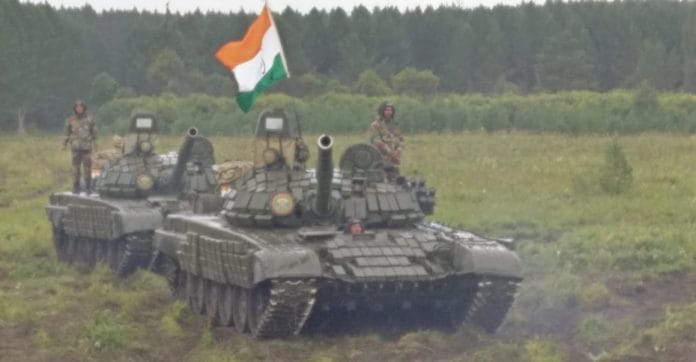The statement comes a week before the maiden 2+2 dialogue in Delhi between the foreign and defence ministers of India and the US.
New Delhi: The US has put India on notice with regard to its military and strategic partnership with Russia: Change course, or possibly face sanctions.
The statement comes as India prepares to buy five S-400 missile defence systems from Russia as part of a Rs 39,000 crore deal, and a week before the maiden 2+2 dialogue between the foreign and defence ministers of India and US.
The US has suggested that the waiver from sanctions it has allowed for India’s purchases of a major military platform from Russia is not absolute. It has also offered to negotiate with India the transfer or sale of weapons and systems that India currently buys from Russia.
“We can’t say that we are going to insulate India from a potential fallout (of sanctions under the Countering America’s Adversaries Through Sanctions Act, CAATSA) no matter what they do — I would say that such an impression would be misleading,” said Randall G. Schriver, assistant secretary of defence for Asian and Pacific Security Affairs at the US department of defence.
Schriver, who has been involved in talks for the 2+2 dialogue and is expected to be part of the US delegation, was speaking at the Washington D.C. centre of Carnegie Endowment for International Peace, a foreign policy thinktank, Wednesday.
Also read: As US-Russia ties blow hot & cold, Moscow wants same military deal America has with India
Signed into law last August by the Trump administration, the CAATSA seeks to punish entities involved in significant transactions with the defence and intelligence sectors of Russia.
Asked how the US viewed India’s potential purchase of the S-400 system from Russia, he added, “We still have some very significant concerns if India pursued major new systems and platforms with Russia. That will be the President’s decision.”
Schriver said defence secretary James Mattis had requested a waiver for India from the CAATSA because he wanted relations with India to improve and strengthen.
“We know where we want this relationship to go, whether it is to persuade to go a different course (from Russia), take us as a major defence partner, we know where we want this to go,” he added.
“The S-400 is a system that is particularly troubling for a lot of reasons. India is our friend, a sovereign country,” he said.
“Our strong preference is to seek alternatives (or else it would impinge on a number of issues) including the future of our defence cooperation,” Schriver added.
Will the US fill the void?
Asked if the US would be willing to offer India alternatives, he replied: “We are willing to talk to India about meeting defence requirements and alternatives. They may not be the exact systems. We have had that conversation.”
Also read: Modi realises he still needs Putin as the world order is turning upside down
Earlier, in his opening remarks in conversation with Carnegie fellow and India hand Ashley Tellis, Schriver said the Pentagon was aware of legacy issues that India had with Russia on supplies and spares of military equipment.
Russia is India’s largest supplier of military equipment, and has been (as the USSR) since 1971.
“But we want to have a conversation with India that is not about the past, the legacy, but about the future,” he said.
Schriver flagged three issues where he expected there would be concrete results from the 2+2 dialogue.
The first would be on a set of “enabling agreements” on secure communications and technology. This implies the US expects its proposed Communications Compatibility and Secrecy Agreement (COMCASA), a military secrecy pact, to get India’s approval.
The second, he said, would be to expand the scope of military exercises. The expansion would bring more elements in terms of platforms, and may also involve aircraft, submarines, ships and army units not just in greater numbers but in joint operations.
The third area, Schriver added, would be an augmentation of the 2+2 dialogue with more 2+2 meetings at executive levels, below the levels of the ministers and secretaries.
These would be in addition to security reviews in the Indo-Pacific region.
Mattis and US secretary of state Mike Pompeo will be in Delhi Thursday and Friday next week for a dialogue with defence minister Nirmala Sitharaman and external affairs minister Sushma Swaraj.







Biggest defense importer in the world for years paying the price. No strategic independence and hence, interference. As long as India continues to import strategic weaponry, it will continue to be a second-class world power.
A sovereign country like India’ has the right to think and decide independently . It can buy weapons and goods of its choice through burgaining and negotiation and these can’t be regulated by Mr.Trump or any other external leader/country. What right has he got to dictate India ?
Unclear what useful purpose the oft postponed 2 + 2 meeting will serve. It is evident there are wide differences between the two countries. America is on the verge of banning the spouses of H 1 B visa holders from working in their country. Asking a sovereign country to wind up a time tested defence relationship as the price of creating a new one seems unacceptable. President Macron has said just a couple of days back that Europe can no longer count on the US for its security, must chart its own way forward. A time to tap into the talent pool of the professional diplomats serving in MEA, along with its institutional memory.